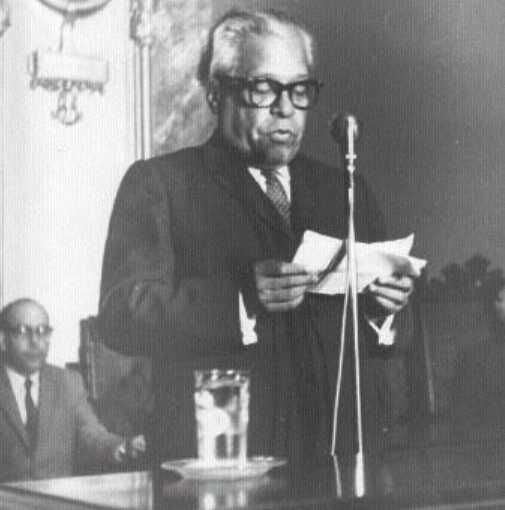4.1.1.14.13 Other poetic texts by Nicolás Guillén

Nicolás Guillén’s poetic activity includes other pieces that may not be associated with high aesthetic peaks, but which complement the study of his work, especially because some of them stray somewhat from the artistic currents with which his lyrical career is generally identified.
Guillén’s intense public activity, beginning in 1947, included communicating with the public through the press, even on a daily basis. He edited a daily section in the newspaper “Hoy” in 1949, and the weekly “La última hora.” In these sections, he published epigrammatic texts that lyrically presented a significant amount of popular wisdom.
These texts constitute a way of conveying national events in poetry, with a poetic framework that is the antithesis of purism. A mild hilarity or, at times, a marked satirical tone permeates the texts, in a language that allows them to be grasped by a wide range of readers. Wit and irony sometimes prevail over strict poetic content, as the communicative purpose is paramount.
In 1965, in an edition edited by Ángel Augier, the poetry collection “Cerebro y corazón” appeared, which is based on a selection of poems so early that they appeared in magazines and newspapers in the years prior to 1922, especially in “Camaguey”, “Gráfico”, “Orto” and “Castalia”.
The collection of poems constitutes a separate entity within the poetic production of Nicolás Guillén, in which he moves within the orbit of poetry of this second republican decade, with the enthronement of modernism marked by the poetic achievements of Rubén Darío.
The text reveals a “bookish” lyricism, since more than a determined vital sensibility, one can appreciate readings of romantic sign and a mastery of Hispanic metric forms but without discernible substantive content from other minor creators of the period.
His later pieces have not been fully appreciated in their poetic magnitude, as is the case with “El corazón con que vivo” (The Heart I Live With), from 1975, but ultimately all of them extend the thematic and stylistic scope of Guillen’s work, already extensive and profound in its worldview of humanity and in the artistic depth of his lyrical proposals. A National Poet of Cuba, the genesis of his work lies in the profound roots of the nation as a people, and he always returns to it, sometimes losing his name and leaving only his voice, echo after echo in the mouths of the people.








